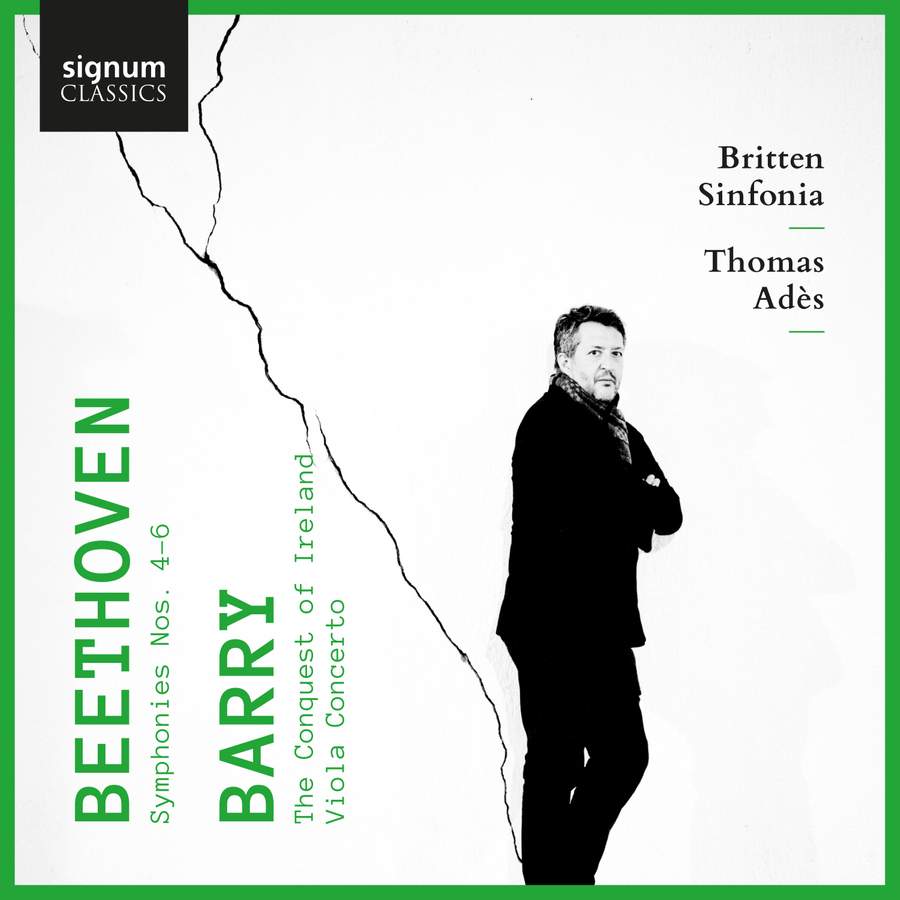BEETHOVEN Symphonies 4-6 BARRY Conquest of Ireland (Adès)
View record and artist detailsRecord and Artist Details
Genre:
Orchestral
Label: Signum Classics
Magazine Review Date: 02/2021
Media Format: CD or Download
Media Runtime: 139
Mastering:
DDD
Catalogue Number: SIGCD639

Tracks:
| Composition | Artist Credit |
|---|---|
| Symphony No. 4 |
Ludwig van Beethoven, Composer
Britten Sinfonia Thomas Adès, Conductor |
| Symphony No. 5 |
Ludwig van Beethoven, Composer
Britten Sinfonia Thomas Adès, Conductor |
| Viola Concerto |
Gerald Barry, Composer
Britten Sinfonia Lawrence Power, Viola Thomas Adès, Conductor |
| Symphony No. 6, 'Pastoral' |
Ludwig van Beethoven, Composer
Britten Sinfonia Thomas Adès, Conductor |
| The Conquest of Ireland |
Gerald Barry, Composer
Britten Sinfonia Joshua Bloom, Bass Thomas Adès, Conductor |
Author: Andrew Farach-Colton
I found Thomas Adès and the Britten Sinfonia’s interpretations in the first volume of their Beethoven cycle (7/20)unrelentingly hard-driven, so I heaved a huge sigh of relief when a mere three and a half minutes into the Fourth Symphony on this new instalment Adès relaxes the tempo as the music moves into more lyrical territory. A year separates these live recordings from their predecessors, and while there’s no loss of vigour or sinew, the significant increase in warmth and flexibility makes a world of difference. Take the slow movement of the Fifth, for instance, where the conductor immediately delineates the dual nature of the main subject by having the woodwinds enter with heart-melting tenderness.
Such richness of characterisation goes hand in hand with a greater attention to details of colour and texture. Note, for instance, how Adès has the bassoons play quasi-pizzicato as they accompany the glorious clarinet solo in the Adagio of the Fourth (at 2'22"), or in the Scherzo of the Fifth, where it’s as if the orchestra were creeping on tiptoe (at 2'54"). The performances of both symphonies are terrific from start to finish, in fact. I love the outdoor, festively martial quality he gives to the Fifth, and how the coda generates tremendous excitement while remaining light on its feet.
I wish I could say I’m as smitten with the Pastoral, but much of it is so fast as to feel unsettled and the playing is noticeably scrappier. There are some lovely moments, like the ravishing pianissimo in the ‘Scene by the Brook’ right after the music slips into G flat major (listen starting at 6'25"), and I rather like the mad scramble he makes of the Scherzo’s Presto coda – one can visualise the peasants scurrying home to escape the oncoming deluge.
As for the two works here by Gerald Barry, they could not be more different, at least on their surface. The Conquest of Ireland (1995), a setting of a shockingly mundane 12th-century text, is dizzyingly chromatic and rhythmically (and metrically) chaotic, while a great deal of the Viola Concerto (2019) is purely diatonic and moves for the most part in purposeful quavers, evoking the narrow world of the instrumental exercise – although it does so with the composer’s unique sense of humour and dramatic sleight of hand. Indeed, what’s so fascinating about Barry’s music is how it often appears too clever by half yet somehow always avoids glibness, and how at times the humour itself provides the opportunity for flashes of pathos – as when the bass in The Conquest of Ireland sings of how the Irish are ‘a barbarous people, literally barbarous’.
The bass part is ridiculously – and sublimely – virtuoso, and sung brilliantly here by Joshua Bloom. Lawrence Power digs into the Concerto with an apt tone of studiousness and under Adès the Britten Sinfonia play both scores for all their worth. Heartily recommended.
Discover the world's largest classical music catalogue with Presto Music.

Gramophone Digital Club
- Digital Edition
- Digital Archive
- Reviews Database
- Full website access
From £8.75 / month
Subscribe
Gramophone Full Club
- Print Edition
- Digital Edition
- Digital Archive
- Reviews Database
- Full website access
From £11.00 / month
Subscribe
If you are a library, university or other organisation that would be interested in an institutional subscription to Gramophone please click here for further information.




